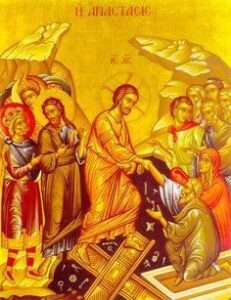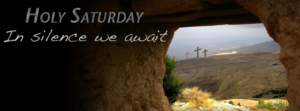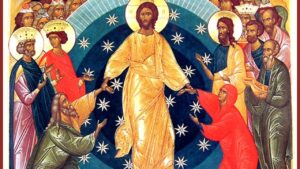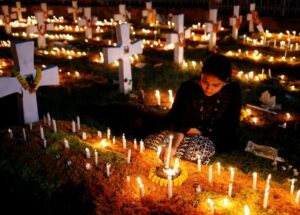The Great, Holy Saturday – The Blessed Sabbath (Sabbatum Sanctum) / Christ Repose in the Tomb and His descent into Hades

The Great, Holy Saturday is the day, between the day of sorrow of the Crucifixion of our Lord and the day of Joy of His glorious Resurrection. On, Great and Holy Saturday, the Orthodox Church commemorate and relive the burial of Christ, His repose in the tomb and His descent into Hades. Great Saturday is the day of the pre-eminent rest. Christ observes a Sabbath rest in the tomb. The great Moses mystically foreshadowed this day when he said: God blessed the seventh day. This is the day of rest, on which the only-begotten Son of God rested from all His works. Thus is the blessed Sabbath, (Sabbatum Sanctum), is sacred as the day of the Lord’s rest. Holy Saturday is that indispensable link between Christ’s death and Resurrection.
On Great Saturday, our focus is on the Tomb of Christ, no ordinary grave. It is not a place of corruption, decay and defeat. It is life-giving, a source of power, victory and liberation. The Church contemplates the mystery of the Lord’s descent into Hades (Gk.) Sheol (Heb), the place of the dead, where they were deprived of the vision of God 1 Pet. 3: 18-19. Death, our ultimate enemy, is defeated from within. “He (Christ) gave Himself as a ransom to death in which we were held captive, sold under sin. The walls of hell broke into pieces, before Him. The dead came, received and respected Him. He loosened the bonds of death”. He performed in spirit the Harrowing of Hell and raised up to Paradise those held captive there. Christ, Who is the life of all destroyed death by His death. He vanquishes Satan, hell and death itself.

Christ went down into the depths of death so that “the dead will hear the voice of the Son of God, and those who hear will live” [1 Peter 4:6]. Jesus, “the Author of life”, by dying, destroyed “him who has the power of death, the devil, and [delivered] all those who through fear of death were subject to lifelong bondage” [Jn 5:25; Matt 12:40; Rom. 10:7; Eph 4: 9. He descended there as a Saviour, to proclaim the Good News to the imprisoned spirits 1 Pet. 3: 18-19; Heb. 13: 20. Jesus our Lord holds the ‘Keys of Death and Hades’. Christ, Who art our Lord and God; Thou did trample death by death. There would be no victorious Resurrection without Christ’s descent into and defeat of Hades, and for that reason there can be no true celebration of Passion without the celebration of that victory in Hades, which is Great and Holy Saturday.

Holy Saturday is day of great silence and a great stillness. A great silence because the King of kings is asleep. The earth trembled and is still because God has fallen asleep in the flesh and he has raised up all who have slept ever since the world began. Thus, for us, Holy Saturday is a day of silent prayer and calm vigil, meditating and contemplating on the mystery of the Lord’s passion and His death. The day is and should be the most calm and quiet day of the entire Church year. It is a day of silence, prayer and calmness, and death of the Lord. Christ lies in the grave, the mortal wounds and scars of intense suffering remain visible on His Body; Mary and the disciples are grief-stricken, Jesus’ enemies are still furious, attempting to obliterate the very memory of the Lord by lies and slander. It is also a day of expectation and openness of heart and life in the light of His Resurrection, a vigil day of joyful waiting of the light of His Resurrection, because He put to shame those who crucified Him.

Holy Saturday is also known as ‘Saturday of preaching into the ‘spirit’s and ‘Saturday of evangelism.’ This is the day on which all believers should commemorate the dear departed in the Holy Eucharist. Names are given because Jesus Christ, after His Death on the cross descended to hades and preached unto the spirits (1 Peter 3:19, 4: 6). Holy Eucharist is prohibited on the altar upon which the Holy cross is laid. Hence the Holy Eucharist is celebrated on another altar. The chancel of the Holy of Holies where the Holy Cross is interred is not be unveiled. No one should stand or walk in the Holy of Holies carelessly. The Holy Eucharist begins by noon after completing the canonical prayers till None and after the readings from the Old Testament. The order of this Holy Eucharist too is same as the one on Maundy Thursday. Like on Maundy Thursday, there will be no kiss of peace or kissing the hand of the priest. The believers disperse after making their offering. Since it is the day of remembering all the faithful departed, there is the practice of the congregation going to the cemetery to pray and the priest censing the cemetery.
0 Comments